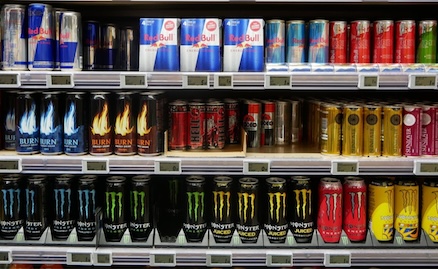
When it comes to choosing drinks, learning to discern those that are healthy from unhealthy for maintaining good health may not be the easiest of tasks at times. Clever enticing advertising, or even bad science, or deceptive marketing may be used to cover up a multitude of potential health risks associated with a number of drinks, as advertisers tempt you into buying.
Take, for examples, the cases of soda and sugary drinks.
Some frequent and long-term consumers of another type of drink may not even be aware any associated health risks. I’m referring to the health risks associated with energy drinks:
Energy drinks are chosen by many people, especially the younger generation for their charge-me-up appeal. However, did you know that the consumption of energy drinks, not only when drinking frequent and long-term, but also short-term comes with serious health risks?
Recent Study
An alarming recent study led its researchers to conclude that energy drinks with their high-caffeine, high-sugar content are capable of negatively impacting heart health. (1)
Within less than 90 minutes after energy drink consumption, a consumer’s blood vessels may be significantly vasoconstricted (severely narrowed) causing a lack of blood supply to the body’s major organs, reducing organ functionality.
A lack of blood flow to the heart through constriction may lead to heart failure or strokes. As shown by the research, that’s what happens after consuming these energy drinks in 90 minutes.
…and that’s not all. Energy drinks with their high sugar content causes a significant rise in blood glucose levels which can lead to an outness of metabolic function leading to ailments such as type 2 diabetes, characterised by insufficient insulin, or prediabetes.
Prediabetes is where blood glucose levels are too high, but fall below the threshold of diabetes mellitus; an under-production of insulin from the pancreas or the body’s cells not becoming responsive to insulin.
It took only ONE drink to damage healthy blood vessels…
A study conducted at the University of Texas, at Houston, looked to see if energy drinks would have an affect on 44 young generally healthy non-smoker students. Each student had been found to have healthy blood vessels as indicated by the examination of their epithelial cells lining and making up the inner-walls of their blood vessels.
The results showed that after each student had drank one 24-ounce energy drink, in just 90 minutes after drinking the students healthy blood vessels had become damaged.
The damage had been indicated by taking diameter measurements of the inner-walls of the arteries (blood vessels) then remeasured after energy drink consumption. After 90 minutes post-consumption the diameters were diminished by half:
The conclusion was that there was on average a 5.1% to 2.8% inner-wall reduction taking all students into consideration had been caused by the drink’s high caffeine, sugar and taurine stimulant contents. (2)
A 250ml energy drink contains about 80mg of caffeine. That’s around 2.5 times more caffeine than the average soda drink. The researchers further concluded that in spite of the high caffeine content, a well-known agitating stimulant, the sugar ingredient in these drinks was the biggest culprit in arterial (blood vessel) constriction.
Did you know, for example, that Red Bull has around 37g of refined sugar? -That’s roughly more than 9 teaspoons full!
Taking the above research into consideration It is important to remember that healthy blood vessels are crucial for good cardiovascular function.
The message from the research is loud and clear, especially to young people as they are the biggest consumers. (3) These energy drinks come with serious health risks! Don’t make the habit of associating high-vigor exercise training with the need to be supported by energy drinks. The consequences could lead to a heart attack.
Alternatives to energy drinks
The best investment you can ever make is in your health. What’s the point in having a lot of money when you’re greatly restricted through debilitating ill-health, unable to reap the benefits?! No, like I said, the best investment you can ever make is in your health, especially in the long-term. So in the long-term, as a contributer to good health, it makes sense to choose alternatives to energy drinks.
Parents might want to monitor their young-teen children with a viewpoint to restricting their energy drinks…
Look for natural alternatives. These alternatives are lower in sugar and caffeine content and promote good health. Alternatives include coconut water, juiced fruits such as melon, pineapple, orange… and vegetable juices like carrot, kale or cabbage…
Green tea is another excellent choice. Green tea has many health benefits. This includes anti-cancer properties, reduction in cognitive decline and antioxidant properties.
-All these alternatives are packed with health-promoting vitamins and enzymes, having energizing effects. All worth getting into the habit of a lifetime for consuming. When making these choices, notice the differences in your mental and physical health. -You’ll never look back!
References:
1. Substance abuse and cardiovascular risk: energy drinks
https://pubmed.ncbi.nlm.nih.gov/39072593/
2. Energy drinks narrow blood vessels within 90 minutes of intake
3. Energy Drinks
https://www.nccih.nih.gov/health/energy-drinks
